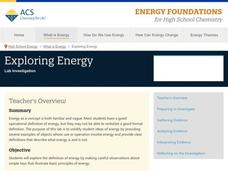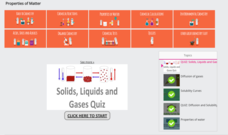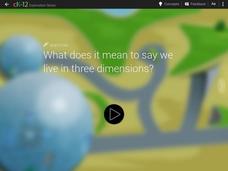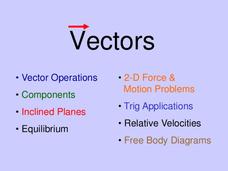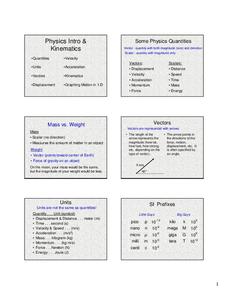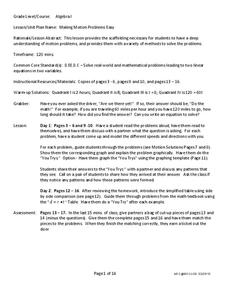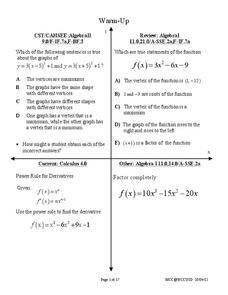Concord Consortium
Energy of a Pendulum
Just a swingin'! Introduce physical science scholars to the energy forms associated with a pendulum using a simple interactive. Learners adjust the height from which the pendulum starts, then observe changes in potential, kinetic, and...
Concord Consortium
Pendulum and Spring
Up, down, back, and forth. When you make a pendulum out of a spring, there's a lot to observe. Aspiring masters of motion examine the combined kinetic energies of spring and pendulum motion using a detailed interactive. Learners observe...
American Chemical Society
Exploring Energy
When asked to list everyday objects that require energy, most people list technology that use batteries or electricity. Through hands-on exploration, young scientists discover energy is much more than just circuitry. They play with...
Fuse School
Quiz: Solids, Liquids and Gases
Time to show what they know! Module five in a 14-part series about solids, liquids, and gases redirects to an interactive quiz. Learners test their skills on topics such as states of matter, phase changes, and Brownian Motion. With...
CK-12 Foundation
Model Rocket
Acceleration, velocity, mass, and gravity all play a role in the motion of a rocket. Young scientists explore the connection among these components using an interactive tutorial. They adjust the mass and thrust force to experiment with...
CK-12 Foundation
Irwin and Ruthie
Learners compare acceleration to displacement through an interactive tutorial that permits them to adjust the running strategy of two robots and watch them race. A graph displays the robot's velocity over time and another shows their...
CK-12 Foundation
Butterfly Stroke
Swimmers improve their times by understanding the physics of their sport. As a swimmer moves through the water, the efficiency of motion affects the resulting velocity. Through an interactive simulation, pupils change the level of motion...
CK-12 Foundation
Irwin 2D
Learners explore two-dimensional motion through visual modeling with an interactive lesson that allows them to control the path of a robot. Graphs show both the horizontal and vertical motion as the robot continues through its entire route.
Columbus City Schools
Speed Racers
Who wants to go fast? The answer? Your sixth-grade science superstars! The complete resource offers the ultimate, all-inclusive playbook for mastering the important concepts of speed versus time; distance versus time; and how to graph...
CK-12 Foundation
Bow and Arrow
Where does the energy of an arrow come from? Is it from the person, the bow, or somewhere else? A simulation allows scholars to adjust the stretch distance and the elastic constant in order to understand where the energy comes from, what...
Bowels Physics
Methods of Motion
How could you earn a $6,000,000 speeding ticket? This presentation uses an analogy that relates speed in the universe to the cost of a speeding ticket. Scholars ultimately understand that motion is relative. Also covered is the concept...
Columbus City Schools
It’s All Relative
Are the people on the other side of the world standing upside down? Pupils discuss the relationship between movement and position words. The unit explores the concept of reference points through animation, modeling, photography, and more.
Bowels Physics
Projectile Motion
Hit a bullseye with an engaging presentation about the components of projectile motion. Viewers see how horizontal and vertical motion combine to create the parabolic path of projectile motion.
PHET
Pendulum Lab
How would a pendulum work on the moon or Jupiter? To answer that question scholars control up to two pendulums including their location, length, mass, and amplitude. Added controls include changing the friction and strength of gravity....
Tech Museum of Innovation
Lighter than Air
Scholars participate in two design challenges concerning flight in the second instructional activity of the series. They design balloon crafts that have neutral buoyancy and forward motion.
Teach Engineering
Matching the Motion
It is not always easy to walk the straight and narrow. In the sixth portion of a nine-part unit, groups actively recreate a graph depicting motion. Individuals walk toward or away from a motion detector while trying to match a given...
Urbana School District
Forces
Is your class struggling with Newton's Second Law? Then show them a presentation that covers everything physics scholars need to know about forces. Starting with gravity, the slides focus on Newton's Laws of Motion, and end with an...
Urbana School District
Vectors
I don't always make vector jokes, but when I do, IJK. Vector addition using multiple methods, scalar multiplication, vector subtraction, vector components, relative velocities, free body diagrams, and so much more Are covered in this...
Urbana School District
Physics Intro, Kinematics, Graphing
Some consider physics the branch of science concerned with using long and complicated formulas to describe how a ball rolls. This presentation, while long, is not complicated, yet it covers rolling, falling, and more. It compares vectors...
Urbana School District
Projectile and Circular Motion, Torque
Introduce your young scholars to the concepts of circular motion, projectile motion, angular speed, simple harmonic motion, torque, center of mass, centripetal force, and Hooke's Law with a 86-slide presentation. The circular motion...
West Contra Costa Unified School District
Motion Problems
Let's hope class participants don't get motion sickness. In the lesson, class members first solve motion problems using tables and graphs. They then use algebraic techniques to solve motion problems.
West Contra Costa Unified School District
Particle Motion
Derivatives are useful for many things — they can even keep track of particle motion. An informative lesson plan provides an introduction to the idea of the second derivative in particle motion. Class members determine the velocity...
Mr. E. Science
Motion
An informative presentation covers motion, metric system, conversions, graphing of coordinates and lines, speed, velocity, and acceleration problems, as well as mean calculations. This is the first lesson in a 26-part series.
Teach Engineering
Ramp and Review (for High School)
Rolling for momentum. As part of a study of mechanical energy, momentum, and friction, class members experiment rolling a ball down an incline and having it collide with a cup. Groups take multiple measurements and perform several...




